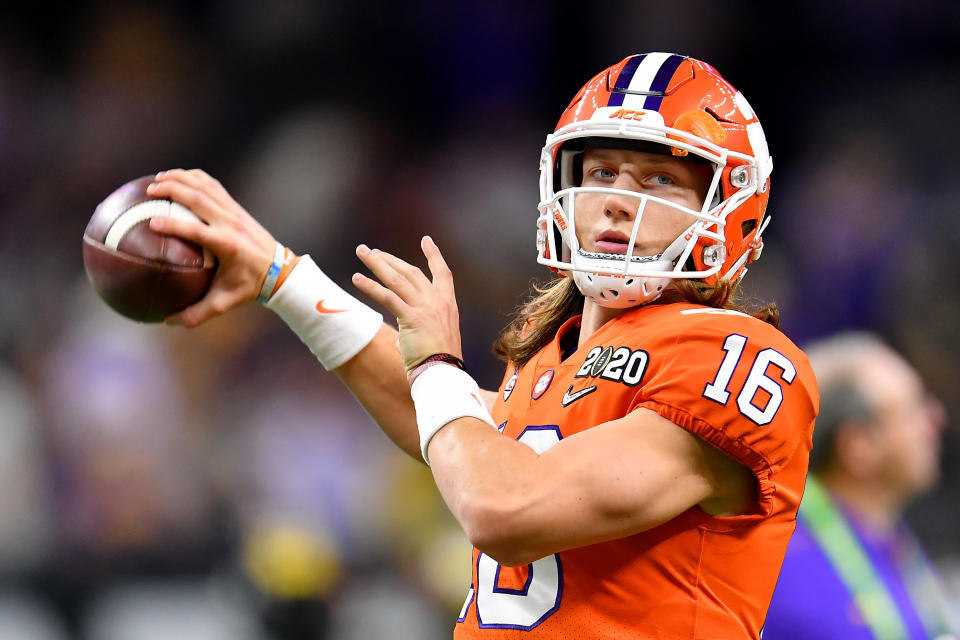Could top stars skip college football if 2020 season is delayed?
There’s little doubt that Clemson’s Trevor Lawrence, Oregon’s Penei Sewell and LSU’s Ja’Marr Chase will be among the defining faces of the 2021 NFL draft. The path of elite players like them to the NFL draft, however, could end up in flux.
As the future of college football trends toward models that include delays or fractured schedules for the 2020 season, the potential for elite players to skip the college football season has emerged as a possibility if the season includes a significant delay.
The question quietly being asked in athletic departments and conference offices is whether star players would want to play through the spring and immediately enter the grind of the draft process and then NFL training camp.
Families of top prospects being courted by agents are asking questions about potentially skipping the season if it’s delayed. One industry source summed up the conversation this way: “They may save college football by playing in the spring, but it may be played without the stars.”
To be clear, no stars have publicly indicated their preference on the different hypothetical scenarios for the season. But the conversations happening behind the scenes make it apparent that a delayed season could mean an option for top players to sign with agents, work out privately and spend the year getting ready for the draft.
Publicly, most officials across college athletics are mustering up smiles on their faces and hoping that students will be back in school. That could mean the football schedule will play out as planned and the billion-dollar machine of college football will be back to business. But the reality is that there are all kinds of plans and contingencies being discussed, including worries about the reverberations of an alternate schedule.

For football to be played from January to May in 2021, for example, would mean that the NFL would have to push back the late-February combine and late-April NFL draft. (The combine is especially important for medical records, which some consider more valuable to NFL teams than the workout performances.)
The notion of attrition of stars has emerged as a concern if that late-starting model arises. The prospect of injury risk and potentially playing in inclement weather for a majority of the season looms large.
“I think about it, for sure,” said an athletic official at a perennial top-20 program. “I feel like from the upper-tier of programs, everyone is going to have those types of key players. Some are going to be more impacted than others. That’s going to be on the table. You wouldn’t blame the kids if they consider those things.”
Yahoo Sports reached out to a handful of athletic officials, who had varied opinions. “I’ve heard that concern,” said a Power Five athletic director. “I think it’s something to consider. I think it’s something that some kids will do. The question is, how many?”
Elite players who’ve only been in college for two seasons – think Trevor Lawrence or Ohio State’s Justin Fields – would not be eligible for the NFL supplemental draft this summer. (The NFL supplemental draft lives in a weird netherworld, as there’s still no set date for this year’s supplemental draft. Typically, it’s held in July prior to training camp.) According to the NFL-NFLPA collective bargaining agreement, no player is eligible for the supplemental draft “until three NFL regular seasons have begun and ended following either his graduation from high school or graduation of [his class].” There’s been speculation that 2020 draft-eligible players could petition for the supplemental draft – think a player like Clemson’s Travis Etienne who returned to play one more year. The NFL declined to offer clarity on the reality of that, but there’s little incentive for the NFL to want a flood of players in the supplemental draft.
It’s apparent that the college season is trending toward some type of significant change. While the announcement that states like Iowa, Oregon and Oklahoma are hoping and planning to have students on campus has provided a jolt of optimism for a traditional football season, there are still few officials who can see all 130 FBS campuses playing football with fans in the stands.
The question of what football could look like has remained the dominant one across the sport. (The NY Post reported the NFL would consider playing Saturday games in the event of no college football.)
SEC commissioner Greg Sankey hinted at one of the options being discussed behind the scenes on Thursday. In a radio interview in with Jacksonville’s 1010XL, he mentioned the scenario “if a couple of programs aren’t able” to play in the fall. “Does that stop everyone? I’m not sure it does.” Sankey did mention the preference of the sport to “move along together.” But a public figure hinting at some leagues moving ahead while others are still handcuffed was fascinating.
The disparity in the severity of virus in different geographic locations combined with drastically different government restrictions have led to two apparent paths. One is a selective start, which could mean that some schools miss the season while others press forward. The other is pushing the entire season back to 2021 with the hopes of better treatment, knowledge and availability of testing to increase the chances that all of the programs will be able to play. (And have a better chance to play in front of fans, which is more than $50 million in revenue for the top programs.)
Until there’s clarity on the college football season, we’ll remain trapped in speculation season. But it’s become apparent that elite draft prospects will have difficult decisions to make if there’s a significant delay in the season.
More from Yahoo Sports:

 Yahoo Sports
Yahoo Sports 